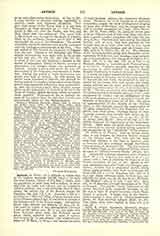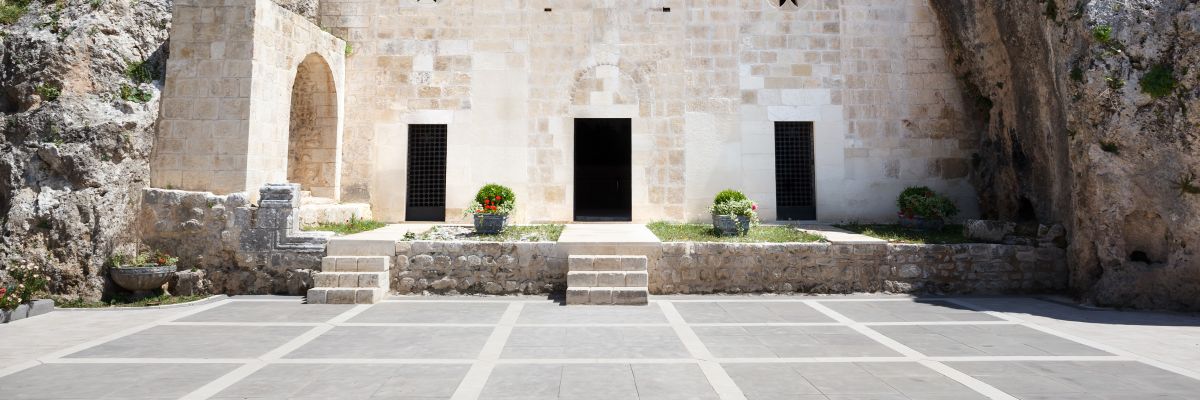

Antioch, of SYRIA. —It is difficult to realize that in the modern Antakieh (28,000 inhab.), we have the once famous “Queen of the East”, which, with its population of more than half a million, its beautiful site, its trade and culture, and its important military position, was a not unworthy rival of Alexandria, the second city of the Roman empire (cf. Josephus, Bel. Jud., III, 2, 4). Founded in 300 B.C. by Seleucus I (Nicator), King of Syria, Antioch stood on the Orontes (Nahr el Asi), at the point of junction of the Lebanon and of the Taurus ranges. Its harbor, fifteen miles distant, was Seleucia (cf. Acts, xiii, 4). The name by which it was distinguished [`Antiochia e pros (or epi) daphne, now, Bet el ma, five miles west from Antioch] came from the ill-famed sacred grove, which, endowed with the right of asylum, and so once, by “a rare chance”, the refuge of innocence (cf. II Mach., iv, 33 sq.), had become the haunt of every foulness, whence the expression Daphnia mores. However, the vivid description of Antioch’s immorality, largely the result of the greater mingling of races and civilizations, may be exaggerated; as said in another connection [cf. Lepin, Jesus Messie, etc. (2d ed., Paris, 1905), 54, note], les braves gens n’ont pas d’histoire, and of that class there must have been a goodly number (Josephus, Bel. Jud., VII, 33; Acts, xi, 21). The Jews had been among the original settlers, and, as such, had been granted by the founder here, as in other cities built by him, equal rights with the Macedonians and the Greeks (Jos. Ant., XII, iii, 1; Contra Ap., II, iv). The influence of the Antiochene Jews, living, as in Alexandria, under a governor of their own, and forming a large percentage of the population, was very great (Josephus, Ant. Rom., XII, iii, 1; Bel. Jud., VII, iii, 3, VII, v, 2; Harnack, Mission u. Ausbreitung d. Christenthums, p. 5, note 2). Unknown disciples, dispersed by the persecution in which Stephen was put to death, brought Christianity to Antioch (Acts, xi, 19).Cf. Acts, vi, 5, where the author characteristically mentions the place of origin of Nicholas, one of the seven deacons. In Antioch the new Faith was preached to, and accepted by the Greeks with such success that Christianity received here its name, perhaps originally intended as a nickname by the witty Antiochenes (Acts, xi, 26). The new community, once acknowledged by the mother-church of Jerusalem (Acts, xi, 22 sq.), soon manifested its vitality and its intelligence of the faith by its spontaneous act of generosity toward the brethren of Jerusalem (Acts, xi, 27-30). The place of apprenticeship of the Apostle of the Gentiles (Acts, xi, 26), Antioch, became the headquarters of the great missionaries Paul and Barnabas, first together, later Paul alone. Starting thence on their Apostolic journeys they brought back thither the report of their work (Acts, xiii, 2 sq.; xiv, 25-27; xv, 35 sq.; xviii, 22, 23). Acts, xv (cf. Gal., ii, 1-10) clearly evidences the importance of the Antiochene Church. There arose the great dispute concerning the circumcision, and her resolute action occasioned the recognition of the “catholicity” of Christianity.
II. ANTIOCH OF PISIVIA.—Like its Syrian namesake, it was founded by Seleucus Nicator situated on the Sebaste road. This road left the high-road from Ephesus to the East at Apamea, went to Iconium and then southeast through the Cilician Gates to Syria (cf. Acts, xviii, 23). The city lay south of the Sultan Dagh, on the confines of Pisidia, whence its name of “Antioch-towards-Pisidia” (Strabo, XII, 8). Definitively a Roman possession since Amytas’s death (25 B.C.), Augustus had made it (6 B.C.) a colony, with a view to checking the brigands of the Taurus mountains (II Cor., xi, 26). Beside its Roman inhabitants and older Greek and Phrygian population, Antioch had a prosperous Jewish colony whose origin probably went back to Antiochus the Great (223-178 B.C.) (cf. Josephus, Ant., XII, iii, 3 sq.), and whose influence seems to have been considerable (cf. Acts, xiii, 45, 50; xiv, 20 sq.; Harnack, “Die Mission”, etc., p. 2, note 2 and ref.). Acts, xiii, 14-52 describes at length the sojourn of St. Paul at Antioch. The episode, clearly important to the writer, has been justly compared to Luke, iv, 16-30; it is a kind of program-scene where Paul’s Gospel is outlined. A longer stay of the missionaries is implied in Acts, xiii, 49. On his return from Derbe, St. Paul revisited Antioch (Acts, xiv, 20). Two other visits seem implied in Acts, xvi, 4, 6; xviii, 23.
EDWARD ARBEZ


